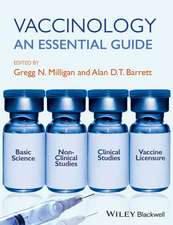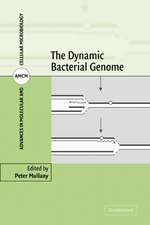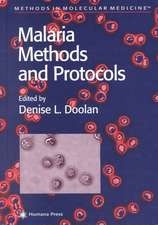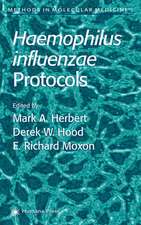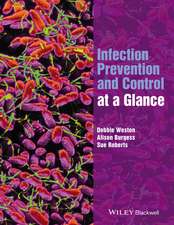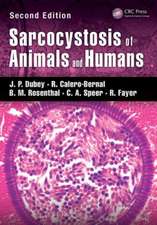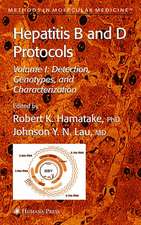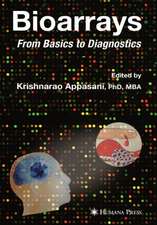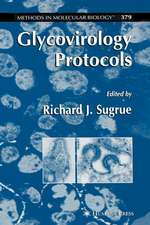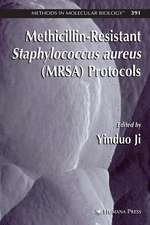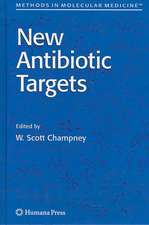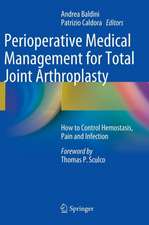Clostridium difficile: Methods and Protocols: Methods in Molecular Biology, cartea 646
Editat de Peter Mullany, Adam P. Robertsen Limba Engleză Hardback – 8 iun 2010
Authoritative and cutting-edge, Clostridium difficile: Methods and Protocols serves as an ideal guide for scientists now in a position to gain an in-depth understanding of how this organism is transmitted and how it causes disease.
| Toate formatele și edițiile | Preț | Express |
|---|---|---|
| Paperback (2) | 720.47 lei 6-8 săpt. | |
| Springer – 9 iun 2018 | 720.47 lei 6-8 săpt. | |
| Humana Press Inc. – 23 aug 2016 | 891.02 lei 6-8 săpt. | |
| Hardback (2) | 648.89 lei 6-8 săpt. | |
| Humana Press Inc. – 8 iun 2010 | 648.89 lei 6-8 săpt. | |
| Springer – 10 aug 2016 | 729.06 lei 6-8 săpt. |
Din seria Methods in Molecular Biology
- 9%
 Preț: 791.63 lei
Preț: 791.63 lei - 23%
 Preț: 598.58 lei
Preț: 598.58 lei - 20%
 Preț: 882.98 lei
Preț: 882.98 lei -
 Preț: 252.05 lei
Preț: 252.05 lei - 5%
 Preț: 802.70 lei
Preț: 802.70 lei - 5%
 Preț: 729.61 lei
Preț: 729.61 lei - 5%
 Preț: 731.43 lei
Preț: 731.43 lei - 5%
 Preț: 741.30 lei
Preț: 741.30 lei - 5%
 Preț: 747.16 lei
Preț: 747.16 lei - 15%
 Preț: 663.45 lei
Preț: 663.45 lei - 18%
 Preț: 1025.34 lei
Preț: 1025.34 lei - 5%
 Preț: 734.57 lei
Preț: 734.57 lei - 18%
 Preț: 914.20 lei
Preț: 914.20 lei - 15%
 Preț: 664.61 lei
Preț: 664.61 lei - 15%
 Preț: 654.12 lei
Preț: 654.12 lei - 18%
 Preț: 1414.74 lei
Preț: 1414.74 lei - 5%
 Preț: 742.60 lei
Preț: 742.60 lei - 20%
 Preț: 821.65 lei
Preț: 821.65 lei - 18%
 Preț: 972.30 lei
Preț: 972.30 lei - 15%
 Preț: 660.49 lei
Preț: 660.49 lei - 5%
 Preț: 738.41 lei
Preț: 738.41 lei - 18%
 Preț: 984.92 lei
Preț: 984.92 lei - 5%
 Preț: 733.29 lei
Preț: 733.29 lei -
 Preț: 392.60 lei
Preț: 392.60 lei - 5%
 Preț: 746.26 lei
Preț: 746.26 lei - 18%
 Preț: 962.66 lei
Preț: 962.66 lei - 23%
 Preț: 860.22 lei
Preț: 860.22 lei - 15%
 Preț: 652.64 lei
Preț: 652.64 lei - 5%
 Preț: 1055.50 lei
Preț: 1055.50 lei - 23%
 Preț: 883.87 lei
Preț: 883.87 lei - 19%
 Preț: 491.89 lei
Preț: 491.89 lei - 5%
 Preț: 1038.86 lei
Preț: 1038.86 lei - 5%
 Preț: 524.16 lei
Preț: 524.16 lei - 18%
 Preț: 2122.34 lei
Preț: 2122.34 lei - 5%
 Preț: 1299.23 lei
Preț: 1299.23 lei - 5%
 Preț: 1339.12 lei
Preț: 1339.12 lei - 18%
 Preț: 1390.26 lei
Preț: 1390.26 lei - 18%
 Preț: 1395.63 lei
Preț: 1395.63 lei - 18%
 Preț: 1129.65 lei
Preț: 1129.65 lei - 18%
 Preț: 1408.26 lei
Preț: 1408.26 lei - 18%
 Preț: 1124.92 lei
Preț: 1124.92 lei - 18%
 Preț: 966.27 lei
Preț: 966.27 lei - 5%
 Preț: 1299.99 lei
Preț: 1299.99 lei - 5%
 Preț: 1108.51 lei
Preț: 1108.51 lei - 5%
 Preț: 983.76 lei
Preț: 983.76 lei - 5%
 Preț: 728.16 lei
Preț: 728.16 lei - 18%
 Preț: 1118.62 lei
Preț: 1118.62 lei - 18%
 Preț: 955.25 lei
Preț: 955.25 lei - 5%
 Preț: 1035.62 lei
Preț: 1035.62 lei - 18%
 Preț: 1400.35 lei
Preț: 1400.35 lei
Preț: 648.89 lei
Preț vechi: 763.40 lei
-15% Nou
Puncte Express: 973
Preț estimativ în valută:
124.18€ • 129.17$ • 102.52£
124.18€ • 129.17$ • 102.52£
Carte tipărită la comandă
Livrare economică 14-28 aprilie
Preluare comenzi: 021 569.72.76
Specificații
ISBN-13: 9781603273640
ISBN-10: 1603273646
Pagini: 241
Ilustrații: X, 241 p.
Dimensiuni: 178 x 254 x 16 mm
Greutate: 0.65 kg
Ediția:2010
Editura: Humana Press Inc.
Colecția Humana
Seria Methods in Molecular Biology
Locul publicării:Totowa, NJ, United States
ISBN-10: 1603273646
Pagini: 241
Ilustrații: X, 241 p.
Dimensiuni: 178 x 254 x 16 mm
Greutate: 0.65 kg
Ediția:2010
Editura: Humana Press Inc.
Colecția Humana
Seria Methods in Molecular Biology
Locul publicării:Totowa, NJ, United States
Public țintă
Professional/practitionerCuprins
to Clostridium difficile and the Disease It Causes.- Clostridium difficile: No Longer an Enigmatic Pathogen?.- Clostridium difficile and the Disease It Causes.- Isolation and Culture Techniques.- Clostridium difficile Isolation and Culture Techniques.- Methods for Typing and Epidemiological Studies.- Molecular Typing Methods for Clostridium difficile: Pulsed-Field Gel Electrophoresis and PCR Ribotyping.- Clostridium difficile Toxinotyping.- Multilocus Sequence Typing for Clostridium difficile.- Biochemistry of the Organism.- Molecular Methods to Study Transcriptional Regulation of Clostridium difficile Toxin Genes.- Dissecting the Cell Surface.- Human Intestinal Epithelial Response(s) to Clostridium difficile.- Genomics.- Comparative Genome Analysis of Clostridium difficile Using DNA Microarrays.- Development of Systems for Genetic Analysis of the Organism.- ClosTron-Targeted Mutagenesis.- Methods for Gene Cloning and Targeted Mutagenesis.- Transposon Mutagenesis in Clostridium difficile.- Animal Models of Disease.- Refinement of the Hamster Model of Clostridium difficile Disease.- Methods for Working with the Mouse Model.
Recenzii
From the reviews:
“This book describes a variety of research methods used to investigate the pathogenic properties of Clostridium difficile, a major nosocomial pathogen that causes a severe diarrhea after prolonged antibiotic treatment. … This book would be useful to scientists working with bacteria such as C. difficile that cause toxin-mediated diseases in the colon of their host. … This is a technical book that provides essential methods and techniques to study devastating diseases due to Clostridium difficile.” (Rebecca T. Horvat, Doody’s Review Service, October, 2010)
“This book describes a variety of research methods used to investigate the pathogenic properties of Clostridium difficile, a major nosocomial pathogen that causes a severe diarrhea after prolonged antibiotic treatment. … This book would be useful to scientists working with bacteria such as C. difficile that cause toxin-mediated diseases in the colon of their host. … This is a technical book that provides essential methods and techniques to study devastating diseases due to Clostridium difficile.” (Rebecca T. Horvat, Doody’s Review Service, October, 2010)
Textul de pe ultima copertă
Clostridium difficile, a major nosocomial pathogen shown to be a primary cause of antibiotic-associated disease, has emerged as a highly transmissible and frequently antibiotic-resistant organism, causing a considerable burden on health care systems worldwide. In Clostridium difficile: Methods and Protocols, expert researchers bring together the most recently developed methods for studying the organism, including techniques involving isolation, molecular typing, genomics, genetic manipulation, and the use of animal models. Written in the highly successful Methods in Molecular Biology™ series format, chapters include brief introductions to their respective topics, lists of the necessary materials and reagents, step-by-step, readily reproducible laboratory protocols, and notes highlighting tips on troubleshooting and avoiding known pitfalls.
Authoritative and cutting-edge, Clostridium difficile: Methods and Protocols serves as an ideal guide for scientists now in a position to gain an in-depth understanding of how this organism is transmitted and how it causes disease.
Authoritative and cutting-edge, Clostridium difficile: Methods and Protocols serves as an ideal guide for scientists now in a position to gain an in-depth understanding of how this organism is transmitted and how it causes disease.
Caracteristici
Serves as a comprehensive guide to most of the current techniques for manipulating and analyzing C. difficile Written by scientists who have pioneered modern C. difficile research Brings together in one place chapters from clinicians, clinical laboratory scientist, and basic scientists to provide a comprehensive understanding of the practical state of the art in C. difficile research Includes supplementary material: sn.pub/extras


